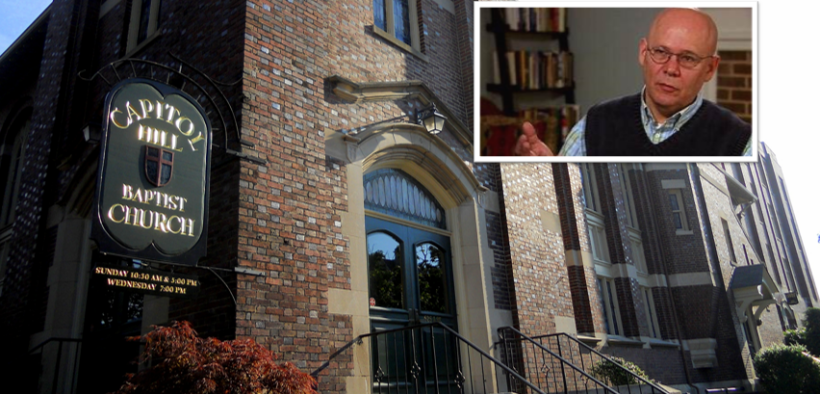EDITOR’S NOTEBOOK: Mark Dever Gives Up Power To Have Influence

Editor’s Note: Most Saturdays we will feature this “Editor’s Notebook” column. MinistryWatch President Warren Smith will offer his opinion on stories in the week’s news or, sometimes, offer a behind-the-scenes look at how and why we do what we do. 
For a growing church to intentionally plant another church, which inevitably has the effect of reducing its own size and financial resources—at least temporarily—is an act of sacrifice and humility. I have come to believe that it is also essential for the spread of the Gospel.
I think that’s especially true in an era in which the institutional church is facing a crisis in confidence and the number of churches is in decline.
For the leadership of a church to make such a decision – to plant new churches – also sends a powerful message to the congregation and to the community that its goal is not the accumulation of power or wealth, but the enlarging of the kingdom of God. For the leadership of such a church, that decision also often translates to giving up income and political or denominational power.
But it is hard to imagine, if God’s Word about such matters is true, that such an intentional dying to self will not yield fruit. In 1 Corinthians 15:36, Paul explained that a seed will not germinate unless it first dies. The multiplying of the church appears to require a similar death, but it is a particular kind of death, the death of personal ambition, a relinquishing of what Friedrich Nietzsche called the “will to power.”
The importance of this idea hit home for me more than a decade ago. My book A Lover’s Quarrel with the Evangelical Church had been recently published. A young intern at Washington, D.C.’s Capitol Hill Baptist Church, Garrett Kell, read the book as part of a year-long pastoral internship program led by that church’s pastor, Mark Dever, and he and Dever wanted to talk.
I had heard of Dever, of course. He had already become an influential figure in evangelicalism. He founded a ministry called 9Marks that published thoughtful books on discipleship and healthy churches. He co-founded the now defunct but once influential organization Together for the Gospel.
I think, though, that I was most fascinated by Dever’s decision, despite his publishing and speaking and organizational successes, to stay at Capitol Hill Baptist Church.
Access to MinistryWatch content is free. However, we hope you will support our work with your prayers and financial gifts. To make a donation, click here.
Don’t get me wrong, CHBC has significant charms. It has a beautiful and historic sanctuary. It was founded in 1878 as Metropolitan Baptist Church. Some say (and some dispute) the name came from Charles Spurgeon’s famous Metropolitan Tabernacle in London. Pastors who preceded Dever included a president of the Southern Baptist Convention (K. Owen White) and a longtime editor of Christianity Today (Harold Lindsell). The church is a 9-iron shot from the U.S. Supreme Court building, and a short walk from the U.S. Capitol. Hill staffers and other inside-the-beltway influencers attend CHBC in droves.
But the church is also landlocked. That beautiful sanctuary seats less than 1,000 people. And don’t expect multiple services or livestream options. One service. It starts at 10:30 and often lasts two hours. Sometimes more. And the church is “old school” in one other respect: It still has Sunday night and Wednesday night services, and they are dedicated to in-depth bible study and discipleship training.
All to say that when Garrett Kell reached out to me after reading my book, I was anxious to get a closer look at what was going on there. So on my next trip to Washington, I took him up on his invitation and had lunch.
Over lunch, Dever explained to me one of the reasons for his church’s success: It has intentionally decided to remain relatively small, and to invest deeply in the members of his church and in men like Garrett Kell. He told me his strategy was not to add, but to multiply. Garrett Kell was one of about a dozen interns Dever was mentoring that year. And he had been doing that for years when I visited them. That process continues today. After Dever trains Kell and the other pastoral interns, he hopes they will plant a church, and he even encourages them to plant new churches in the Washington, D.C., area.
I asked Dever, “Aren’t you afraid Garrett will take some of your members with him?”
I will not forget Dever’s response. He said, emphatically, “No. I’m not afraid Garrett will take some of our members with him. I’m praying he will take some of our members with him.”
Dever’s prayers have been answered. Today, the Washington, D.C., area alone has about a dozen churches planted or revitalized by Capitol Hill Baptist. These are not satellite locations, or “virtual” sites that get Dever’s sermons piped in on a big screen. These are fully autonomous, local churches. They have pastors and elders. One of those church revitalizations is DelRay Baptist Church in nearby Alexandria.
The pastor there is Garrett Kell.
I still think often of that lunch. On that day I learned that we gain influence by giving away power, by helping others succeed. I learned that rapid growth might get your picture on the cover of Christian magazines, but the slow way is sometimes the fast way to see real kingdom growth. Multiplying is better than adding.
The lessons I learned from Mark Dever and Garrett Kell that day more than a decade ago are more needed by the evangelical church today than ever.



